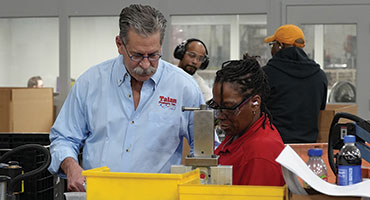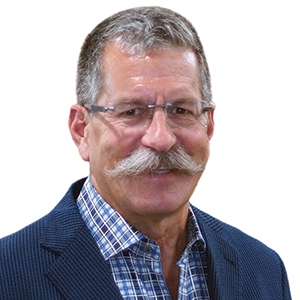The story of Talan Products Inc. has always been one of taking chances. That includes its founding in 1986.
Steve Peplin had been working as a sales rep when he brought a potential job to his family’s business: a high-volume metal stamping project. Peplin’s brother told him to take the job, and they’d figure out a way to get it done.
Creating Talan Products was the way the job — and others to follow — got done, even if it hadn’t exactly been part of Peplin’s original plan.
“The plan was, I was just going to do a deal like a sales rep,” Peplin says. “And then, inadvertently, we started a company.”
The founding partners in Talan Products were Peplin, his brother, Richard C. Peplin Jr., and John Talan, a diemaker. At the time, it had one press and 3,000 square feet of space to work in. Today, Talan Products runs about 40 presses in a 275,000-square-foot plant in Cleveland.
“We’ve grown quite a bit,” Peplin says.
Talan is now owned by Peplin, who serves as CEO, and Pete Accorti, who serves as its president. Accorti joined the company in 1988, and the two bought out Talan and Peplin’s brother in 1996.
“I like to think we still have that passion we had when I started,” Peplin says. “In fact, I know we do.”
Talan Products has always focused on being a high-growth company, riding out the cyclical ups and downs of business. Peplin is more interested in the trend line, and that’s gone up consistently over the years; he even noted that Talan’s 36-year CAGR is 18.7 percent. (And all of that growth to date has been organic; Talan has never made an acquisition, although Peplin says it’s not out of the question for the future.)
Overall, growth is a holistic matter for Peplin. When top-line growth is slow, there are opportunities to grow competencies or efficiencies, “becoming better at what we do,” he says.
Talan, which has about 90 employees, uses non-labor-intensive processes such as high-speed presses. Its processes are concentrated, but the markets it serves are diverse, Peplin says.
“You need to have diversification; otherwise, you’re at risk,” he says.
The majority of Talan Products’ work is in building products. But to consistently grow, it also has long gone after disruptive industries, he says, the ones that innovate and have big growth potential. An early example of that was single-ply roofing. The old style of tar and paper roofing was labor intensive; the polymer sheets used in the newer method were more expensive but required far less labor. When Talan got into the market three or four decades ago, single-ply roofing was less than 10 percent of the industry. Today, Peplin says, it’s about 80 percent
In the years that followed, Talan took similar chances on the electric vehicle, LED lighting and solar panel industries. It’s not always easy to get into these growing markets early, but Talan hasn’t been afraid to take calculated risks. He says Talan’s first solar project was almost taken at a loss, but it helped establish to the customers that followed that they were firmly in the solar industry, not trying to break into it. It gave them that credibility.
Granted, not all of the chances Talan takes turn into success. For example, in the early days of solar, Peplin says there were two main types: solar thermal energy, which makes heat, and solar photovoltaic, which makes electricity. Five or 10 years ago, when gas was expensive, Talan started working in the solar thermal space. When gas prices dropped, the idea of using solar energy for heat no longer made financial sense, and some of Talan’s customers in that space went out of business.
“We don’t always choose the winning horse,” Peplin says. “Sometimes we bet on some bad horses.”
Ultimately, he says he watches for major trends and tracks the ways the economy and demographics are shifting. And Talan works to innovate outside of market diversification, too. It’s adapted to new technology and added robotic applications in areas like welding and assembly. It invests time in organizational development, making sure leaders are all on the same page, he says, and tries new ways of doing business, like scheduling fewer Friday meetings.
Talan’s company values can be boiled down to four, Peplin says: safety, collaboration, tenacity and respect.
The safety value in particular is key, because a metal stamping environment, with its heavy equipment and steel coils, can be dangerous, Peplin says. The company is proud of its culture of safety: Peplin says it has gone as long as seven years without a lost-time injury. And that culture helps in tight hiring and recruiting environments like manufacturing has faced in recent years. Customers and suppliers also tend to want to be aligned with companies that promote safe environments, he said.
“Everybody wants to be part of that winning team,” Peplin says.


